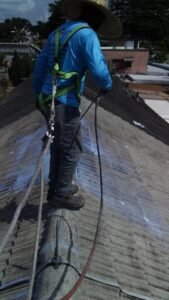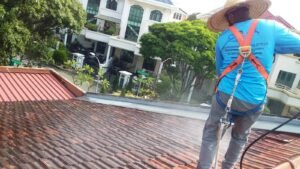Hey there, Singapore homeowners and property managers!
Are you tired of dealing with leaks and water damage?
Well, you’re in the right place.
Today, we’re diving deep into the world of waterproofing in Singapore.
We’ll explore why it’s crucial, how it’s done, and who you can trust to get the job done right.
Let’s start with a common scenario.
Picture this: You wake up one morning to find a small puddle on your living room floor.
At first, you might think it’s just a spill.
But as days go by, you notice the puddle keeps coming back, especially after heavy rain.
That’s when you realize you’ve got a waterproofing issue on your hands.
In Singapore’s tropical climate, waterproofing isn’t just a luxury – it’s a necessity.
Our frequent heavy rains and high humidity can wreak havoc on buildings if they’re not properly protected.
Water damage can lead to mold growth, structural issues, and even compromise the safety of your property.
So, what exactly does a waterproofing contractor in Singapore do?
These professionals are experts in keeping water out of places it doesn’t belong.
They use various techniques and materials to create a barrier that prevents water from seeping into your walls, floors, and ceilings.

Let’s break down the main areas where waterproofing is crucial in Singapore homes and buildings.
First up, we have roof waterproofing.
Your roof is your first line of defense against Singapore’s heavy rains.
A good waterproofing contractor will inspect your roof for any weak spots or damage.
They’ll then apply specialized coatings or membranes to ensure water rolls off instead of seeping in.
Next, we have bathroom waterproofing.
This is a big one, folks.
Bathrooms are constantly exposed to water, making them prime candidates for leaks and water damage.
A skilled contractor will apply waterproof membranes to your bathroom floors and walls before tiling.
This creates a watertight seal that keeps moisture from penetrating the underlying structure.
Moving on to basement waterproofing.
If your property has a basement, you know how prone they can be to dampness and flooding.
Waterproofing contractors use techniques like exterior waterproofing, which involves excavating around the foundation and applying a waterproof coating.
They might also install interior drainage systems to manage any water that does make its way in.
Let’s not forget about balcony waterproofing.
In Singapore’s high-rise living, balconies are common features that need special attention.
Waterproofing contractors will often use liquid-applied membranes or sheet membranes to protect these outdoor spaces from water infiltration.
Now, you might be wondering, “Can’t I just do this myself?”
While there are some DIY waterproofing products out there, tackling a major waterproofing project on your own is not recommended.
Proper waterproofing requires specialized knowledge, tools, and materials.
A professional contractor will have the expertise to identify the root cause of your water issues and apply the most effective solution.
So, how do you choose a reliable waterproofing contractor in Singapore?
First, look for experience.
A contractor who’s been in the business for several years is likely to have dealt with a wide range of waterproofing challenges.
They’ll know which techniques work best for different situations.
Next, check for proper licensing and certification.
In Singapore, reputable waterproofing contractors should be licensed by the Building and Construction Authority (BCA).
This ensures they meet certain standards of professionalism and expertise.
Don’t be shy about asking for references or examples of past work.
A good contractor should be able to provide you with a portfolio of successful projects.
You can also check online reviews and ratings to get an idea of their reputation.
When you’re getting quotes, be wary of prices that seem too good to be true.
Quality waterproofing materials and labor aren’t cheap.
A significantly lower quote might indicate the use of subpar materials or inexperienced workers.
It’s also important to get a detailed contract before any work begins.
This should outline the scope of work, materials to be used, timeline, and warranty information.
Speaking of warranties, a reputable contractor should offer a warranty on their work.
This shows they stand behind the quality of their service.

Now, let’s talk about the waterproofing process itself.
When you hire a contractor, they’ll typically start with a thorough inspection of your property.
They’ll look for signs of existing water damage and potential weak spots.
This might involve using moisture meters or even thermal imaging cameras to detect hidden moisture.
Based on their findings, they’ll propose a waterproofing solution tailored to your specific needs.
This could involve a combination of techniques and materials.
For example, they might recommend applying a waterproof membrane to your roof, along with installing new gutters to better channel rainwater away from your foundation.
The actual waterproofing work can take anywhere from a few days to several weeks, depending on the scope of the project.
During this time, the contractors will prepare the surfaces, apply the waterproofing materials, and allow for proper curing time.
It’s worth noting that waterproofing isn’t a one-and-done deal.
Regular maintenance is key to ensuring long-lasting protection.
Your contractor should provide you with maintenance guidelines to keep your waterproofing in top shape.
Now, you might be wondering about the cost of waterproofing in Singapore.
The truth is, it can vary widely depending on the size of your property, the extent of the work needed, and the materials used.
However, it’s important to view waterproofing as an investment rather than an expense.
The cost of repairing water damage or dealing with mold issues can far exceed the cost of preventative waterproofing.
Let’s look at a real-life example.
A few years ago, a condo owner in Ang Mo Kio noticed some dampness in their living room wall.
They ignored it, thinking it was just due to the humid weather.
Fast forward six months, and they were dealing with extensive mold growth and structural damage.
The repair costs ended up being three times what they would have paid for proper waterproofing.
So, what are some signs that you might need to call a waterproofing contractor?
Keep an eye out for things like damp spots on walls or ceilings, peeling paint, or a musty smell in your home.
If you notice any of these, it’s best to get a professional assessment sooner rather than later.
Remember, in Singapore’s climate, being proactive about waterproofing can save you a lot of headaches down the line.
It’s not just about preventing leaks – it’s about protecting your property value and ensuring a healthy living environment for you and your family.
Before we wrap up, let’s recap the key points we’ve covered today.
We’ve learned why waterproofing is crucial in Singapore’s climate.
We’ve explored the different areas of a property that need waterproofing, from roofs to basements.
We’ve discussed how to choose a reliable waterproofing contractor and what to expect from the waterproofing process.
And we’ve emphasized the importance of viewing waterproofing as a long-term investment in your property.
If you found this information helpful, please give this video a thumbs up.
And if you have any questions or experiences with waterproofing in Singapore, drop them in the comments below.
We’d love to hear from you.

